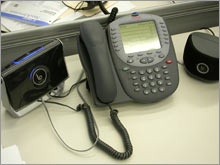 |
| Herman Miller's "Babble" aims to give cubicle dwellers more privacy. |
|
|
|
NEW YORK (CNNMoney.com) -
In the age of cubicle farms and other open-office environments, overhearing the details of co-workers' failed dates and the surreptitious scheduling of doctors' appointments are now unwelcome facts of corporate life.
Enter Babble, a device that turns a neighboring worker's speech into indecipherable gibberish.
According to its marketers, Babble's technology provides "voice confidentiality" at your desk, which the company says can be useful when employees are discussing sensitive or proprietary information. It also claims the device offers reduced distraction for employees who may find themselves inadvertently eavesdropping on their coworkers' conversations.
The product, which hit store shelves this fall, uses patented technology that blends the user's voice with random versions of the user's exact voice.
Herman Miller, parent company of Babble distributor Sonare Technologies, says it's "privacy without walls." The whiz-bang appeal of the new technology surely isn't lost on tech geeks; it won the gold medal in the workplace technologies category at NeoCon, a commercial interiors trade show.
But does it work? And at $395 a pop, is it a practical purchase for employers?
The short answer is yes, it does work, though it definitely takes some getting used to.
To use Babble, which consists of a central device and two speakers, you record a few phrases from a script provided by Babble into the unit. It then uses those samples to obscure your voice as you speak into the telephone. It broadcasts small, separated portions of the user's speech based on the tone and volume of his or her voice and is supposed to sound like the hum you hear in a busy place, like a shopping mall or a crowded restaurant.
How it works
When talking on the phone, you hear what sounds like three or four clones of yourself having a conversation. It essentially makes one voice sound like several – which creates a low-level din.
The effect is strange, though not as annoying as one would think. But the CNNMoney.com test was conducted using only one unit, so it was impossible to tell what it would sound like if several people were using it at once.
One drawback: In open office settings such as the CNNMoney.com newsroom, where there are no partitions between desks, the sound can be distracting to coworkers, especially if the volume of the unit is turned up too loud.
Babble is fairly simple for the end user to use, but fine-tuning the speaker placement takes some work. Babble's makers say a trained IT professional can set up the system properly in about 15-20 minutes.
Still, if it's turned up loud enough and the speakers are placed correctly, it does make it hard to hear exactly what the Babble user is saying.
Tower of Babble
Bill DeKruif, president of Sonare Technologies, acknowledged that too many people using Babble at once could indeed lead to an overly noisy office, but he pointed out that the device is not meant to be used by every employee for every conversation.
He added that a light on the machine tells users when they are speaking too loudly, which has the added benefit of helping to train loud talkers to tone it down. It can also be turned on and off at any time during a conversation.
Setting up the device can be tricky, however, and does require some trial and error to make sure the speaker's voice is completely masked. Set the speakers too far away, and the user's voice isn't masked; set them too close and it's hard to hear the person on the other end of the phone.
Also, the device works with telephone headsets, but only with headsets that connect to the telephone through a separate device. It does not work with headsets that plug directly into the phone.
DeKruif said Herman Miller had been working on the privacy concept for some time but realized that using machine-generated voices and masking sounds to conceal a human voice did not work.
Lest employers think employees would use Babble as a free ticket to make personal calls all day at work, DeKruif points out that occasional personal calls at work are inevitable and that what is really leading to dropped productivity is the fact that they have to leave their desks to make them, rendering them unable to multi-task at their desks while talking on the phone.
"Almost everybody's experienced the problem of lack of privacy, the unexpected phone call you really wish you didn't have to take at your desk," he said. "And companies recognize that it makes people unproductive, and there is a lot of money being spent on separate rooms for private phone calls. It becomes very noticeable in the office when people are trying to do confidential work."
As for who is using Babble, DeKruif said it's favored by human resources departments, which regularly need to communicate sensitive information about employees. Other customers have included law firms and a large aerospace company.
Sonare is already working on a newer incarnation of Babble exclusively for the hospital and pharmacy environments, so that patients and doctors exchanging sensitive information about a patient's medical condition cannot be overheard. The new device would not have to be tethered to a telephone and would be able to mask more than one person's voice at a time, DeKruif said.
-----------------
For more technology news, click here.

|